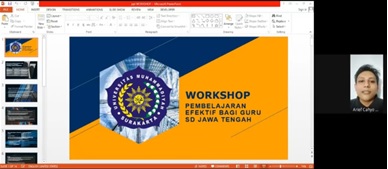Pelatihan pembelajaran efektif berbasis TSAC bagi Guru sekolah dasar di Jawa Tengah
DOI:
https://doi.org/10.53088/penamas.v1i1.70Keywords:
Effective Teaching, Teachers, Elementary SchoolAbstract
The purpose of this community service is to provide an effective teaching training based on TSAC (Teaching Skill Assessment Checklists) for elementary school teachers in Central Java. The strategic and appropriate target audience involved in this activity were elementary school teachers in Central Java as many as 20 person (Surakarta, Klaten, Karanganyar, Demak, Sragen, Brebes). The service materials are as follows: (1) Creating a supportive and warm classroom climate (2) Using waiting time during questions (3) Arranging content for effective presentations (4) Assessing, commenting, and discussing homework (5) Multitasking. A question and answer session was held and a discussion on the problems encountered in the field. After that, to determine the success of the implementation of this activity, an evaluation is carried out at the end of the implementation of the activity. The results of the implementation showed that the participants were very enthusiastic in participating the training. From the results of the question and answer, there are also many problems that exist in the elementary school in Central Java.
References
Devine, D., Fahie, D., & McGillicuddy, D. (2013). What is “good” teaching? Teacher beliefs and practices about their teaching. Irish Educational Studies, 32(1), 83–108. https://doi.org/10.1080/03323315.2013.773228
Grant, L., Stronge, J., Xu, X., Popp, P., Sun, Y., & Little, C. (2014). West meets east: Best practices from expert teachers in the U.S. and China.
Grant, L. W., Stronge, J. H., & Xu, X. (2013). A cross-cultural comparative study of teacher effectiveness: Analyses of award-winning teachers in the United States and China. Educational Assessment, Evaluation and Accountability, 25(3), 251–276. https://doi.org/10.1007/s11092-013-9170-1
Liu, S., & Meng, L. (2009). Perceptions of teachers, students and parents of the characteristics of good teachers: A cross-cultural comparison of China and the United States. Educational Assessment, Evaluation and Accountability. https://doi.org/10.1007/s11092-009-9077-z
Munoz, M. A., Prather, J. R., & Stronge, J. H. (2011). Exploring teacher effectiveness using hierarchical linear models: Student and classroom level predictors and cross year stability in elementary school reading. Planning and Changing.
Stronge.J. (2018). Effective teaching :what does it all mean? In Qualities of effective teachers.
Stronge, J. H. (2013). Effective teachers = student achievement: What the research says. Effective Teachers = Student Achievement: What the Research Says, 1–173. https://doi.org/10.4324/9781315854977
Stronge, J. H., Ward, T. J., Tucker, P. D., & Hindman, J. L. (2007). What is the relationship between teacher quality and student achievement? An exploratory study. Journal of Personnel Evaluation in Education. https://doi.org/10.1007/s11092-008-9053-z
Williams, R. E. (2010). Administrator and teacher perceptions of the qualities of effective teachers. In Education. https://doi.org/10.25774/w4-c9nn-kb54

Downloads
Published
How to Cite
Issue
Section
License
Authors who publish with this journal agree to the following terms:
The author(s) retain copyright and grant the journal the right of first publication with the work simultaneously licensed under a CC BY-SA 4.0 license that allows others to remix, adapt, and build upon the work even for commercial purposes, as long as they credit the author(s) and license their new creations under the identical terms.
License details: https://creativecommons.org/licenses/by-sa/4.0/
Similar Articles
- Choirun Nisa, Fitri Puji Rahmawati, Honest Ummi Kaltsum, Muhamad Taufik Hidayat, Penguatan kompetensi Guru SD melalui integrasi teknologi AR dan AI dalam pembelajaran , Penamas: Journal of Community Service: Vol. 4 No. 1 (2024): Penamas: Journal of Community Service
You may also start an advanced similarity search for this article.
Most read articles by the same author(s)
- Choirun Nisa, Fitri Puji Rahmawati, Honest Ummi Kaltsum, Muhamad Taufik Hidayat, Penguatan kompetensi Guru SD melalui integrasi teknologi AR dan AI dalam pembelajaran , Penamas: Journal of Community Service: Vol. 4 No. 1 (2024): Penamas: Journal of Community Service
- Muhamad Taufik Hidayat, Albi Arangga, Muhammad Abdur Rohman, Faradiyah Nurul Rahmawati, Rina Ulwiyatus Saadah, Arief Cahyo Utomo, Muhroji Muhroji, Workshop model pembelajaran demokrasi guru sekolah dasar di Jawa Tengah , Penamas: Journal of Community Service: Vol. 1 No. 1 (2021): Penamas: Journal of Community Service
- Honest Ummi Kaltsum, Muhamad Taufik Hidayat, Wili Astuti, Peningkatan profesionalisme guru melalui pelatihan model belajar bahasa inggris daily language , Penamas: Journal of Community Service: Vol. 2 No. 2 (2022): Penamas: Journal of Community Service


